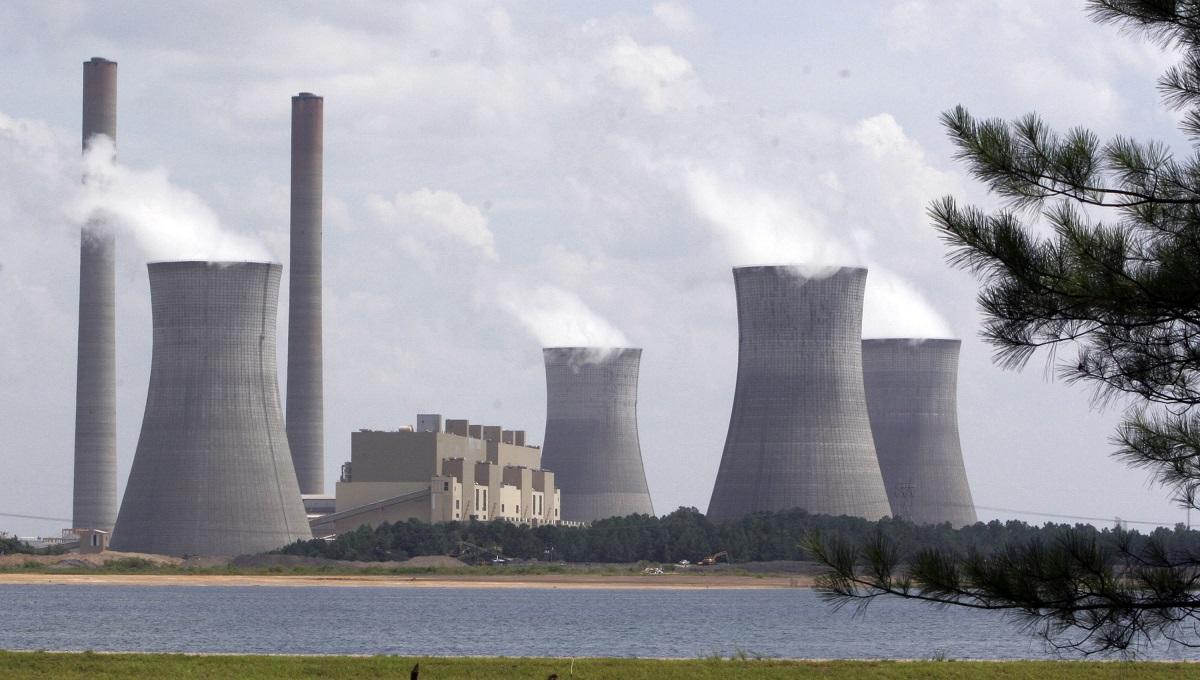Lawsuit Says Plant Scherer Coal Ash Is ‘Poisoning’ Locals

Georgia Power has repeatedly denied that Plant Scherer’s coal ash is linked to any negative health outcomes.
Gene Blythe, File / Associated Press
This story was originally published at Georgia Health News.
When Georgia Power opened Plant Scherer in 1982, few local residents benefited more than the Bowdoin family.
Marvin Bowdoin, who had sold his neighbors on the utility’s promises of more jobs and greater tax revenues for the community, owned a store in the small town of Juliette that sold groceries and gas to the company’s employees.
But over 35 years later, his grandson Tony Bowdoin, who worked at the family’s store for decades, discovered his home’s drinking water was full of contaminants. Last fall, he was diagnosed with Stage IV colon cancer, and is still battling it today.
Tony Bowdoin is one of 45 Central Georgia residents living near America’s largest coal-fired plant who claim in a lawsuit that the utility has unlawfully released, discharged and deposited coal ash into their community’s drinking water source. The residents get their water from private drinking wells, which draw water from the aquifer below the ground.
They’re seeking to force the state’s largest power company to stop polluting the area’s water, provide ongoing medical monitoring, and pay damages.
The mass tort lawsuit, filed Wednesday morning in the Superior Court of Fulton County, where Georgia Power is based, claims that coal ash stored in an unlined basin has contaminated the groundwater surrounding the plant site.
Heavy metals found in that industrial waste are “poisoning” residents, who have suffered health problems such as cancer, cardiovascular disorder, and thyroid damage, the lawsuit said.
“Georgia Power has been a bad neighbor,” said Atlanta-based attorney Stacey Evans, a former state lawmaker and gubernatorial contender who recently won a Democratic primary to regain her seat in the Georgia House (there’s no GOP candidate in the race). “When you’re a bad neighbor, and you hurt your neighbors, you fix it. It’s unfortunate a lawsuit is required to do that.”
The lawsuit comes as federal regulations have required utilities like Georgia Power to either move their toxic waste into landfills with protective liners or permanently seal it in the ground. Georgia Power has pledged to place ash from 19 of its 29 coal ash ponds into a landfill, a costly process intended to protect natural water against potential contamination. The remaining 10 ponds — including Plant Scherer’s — are some of the company’s largest unlined facilities.
Georgia Power has repeatedly denied that Plant Scherer’s coal ash is linked to any negative health outcomes. In a statement Wednesday, Georgia Power spokesman John Kraft told Georgia Health News that the company is “reviewing the lawsuit,” and declined to answer specific questions.
“We believe that the claims have no merit,” Kraft said. “We saw similar claims several years ago that ended up being voluntarily dismissed. We are longtime members of this community; we live and raise our families here and take these allegations very seriously. Georgia Power will vigorously defend itself in this case.”
Hiding the harmful effects?
On the northern edge of the Plant Scherer site, Georgia Power has filled a massive pit with 15.7 million tons of coal ash — enough to fill 4,700 Olympic-sized swimming pools — some of which is in contact with the water table, according to the company’s filing.
The company has previously said the data collected from its network of monitoring wells have revealed “no risk to public health or drinking water.” But the lawsuit alleges that Georgia Power has built a network of groundwater monitoring wells in such a way as to obscure the true extent of the groundwater contamination.
The residents’ lawsuit claims the monitoring wells are “horizontally adjacent” to the coal ash pond. But groundwater first moves down from the coal ash pond to the area’s underground aquifer, the lawsuit said. From there, groundwater flows through the bedrock to streams, lakes, and rivers — and ultimately the drinking water wells of the plant’s neighbors.
According to the lawsuit, the filters that let the ash pond’s water into the monitoring wells are all positioned 380 feet above mean sea level, which is too high to detect contamination in the aquifer.
Toxins’ origins at issue
Georgia Power spokespeople have told local reporters that heavy metals found in drinking water near the plant occur naturally in Central Georgia. One of those elements is uranium, which is found in the mylonite rock throughout the region, and which was at the center of a previous lawsuit filed by Juliette residents in 2013. (A judge dismissed the case without prejudice in 2014, leaving the door open for future claims.)
Brian Adams, a Macon-based attorney who filed the previous lawsuit, has worked with Evans for two years in preparing the current litigation. He said the new claims take things “a few steps further,” in part by alleging that sharp increases of uranium in the area’s water can be traced back to the construction of Lake Juliette, a reservoir built by Georgia Power to service Plant Scherer in the 1970s.
The lawsuit alleges the lake’s construction altered the balance of the local groundwater’s pH levels.
Scientists measure pH on a scale of zero to 14 to determine the acidity of the water. (Low numbers more acidic; higher number are more basic.) The environment can be harmed if there are dramatic changes.
According to the lawsuit, the local pH levels increased from between 6 and 6.8 — which is slightly acidic — to 7.4 — which is slightly basic. The increased pH level “increased the solubility of naturally occurring uranium,” making it more likely to dissolve into the groundwater, according to the lawsuit.
Before the reservoir and plant construction, the U.S. Geological Survey monitored 42 wells near the site. Researchers found that most of those wells detected uranium levels below the Environmental Protection Agency’s minimum detection limit of 0.1 parts per billion. The lawsuit also refers to a more recent University of Georgia study that tested 40 wells in similar locations and found that uranium concentrations had dramatically increased, to levels above the EPA’s maximum contaminant level of 30 parts per billion.
“Georgia Power provided plaintiffs no warning that activity from Plant Scherer and the existence of the unlined coal ash pond regularly exposed, and continue to expose, plaintiffs to toxic substances,” the lawsuit said.
Residents demanding action
The lawsuit is the latest effort by residents to pressure Georgia Power to address a decades-long practice of storing coal ash in unlined basins.
Earlier this year, Juliette residents held a series of town hall meetings about groundwater contamination. Some traveled to the Georgia Capitol in Atlanta to lobby lawmakers to pass a bill forcing Georgia Power to excavate coal ash from Scherer. That effort did not succeed.
After urging local lawmakers to act, the Monroe County Commission has begun to install water lines to an area that has always gotten its water from private drinking wells. The county, along with the Altamaha Riverkeeper, an environmental group, is currently conducting a round of well tests to further assess the groundwater contamination.
Prior to that, Altamaha Riverkeeper’s Fletcher Sams had tested roughly 100 private drinking wells near Plant Scherer for the group. Many of those tests found the presence of hexavalent chromium, the toxic chemical that Erin Brockovich found in California drinking wells, and a host of additional heavy metals including mercury, boron, calcium, sulfate and barium — which are indicators of coal ash.
Even though the installation of county water lines will soon help Juliette residents, Evans said the lawsuit is necessary because “most of the damage has been done to these folks.” The lawsuit notes that coal ash toxins may not only be found in the water, but also in the air — which can happen as water used for cooking or bathing evaporates. The lawsuit says the cancer rate in Monroe County is “more than double the state and national averages.”
The residents seek damages for personal injuries and property damage, a medical monitoring fund, attorneys’ fees, and a jury trial. In addition, they are seeking an injunction to prevent Georgia Power from “continuing their trespass and nuisance” — a form of relief that lawyers say could be achieved by forcing Georgia Power to place a protective liner in the pond to prevent further coal ash toxins from leaking into the groundwater supply.
“We can’t ignore the harm being done,” Evans said. “We’re looking for complete relief for our clients. That’s what they deserve.”
Max Blau is a freelancer working for Georgia Health News.








